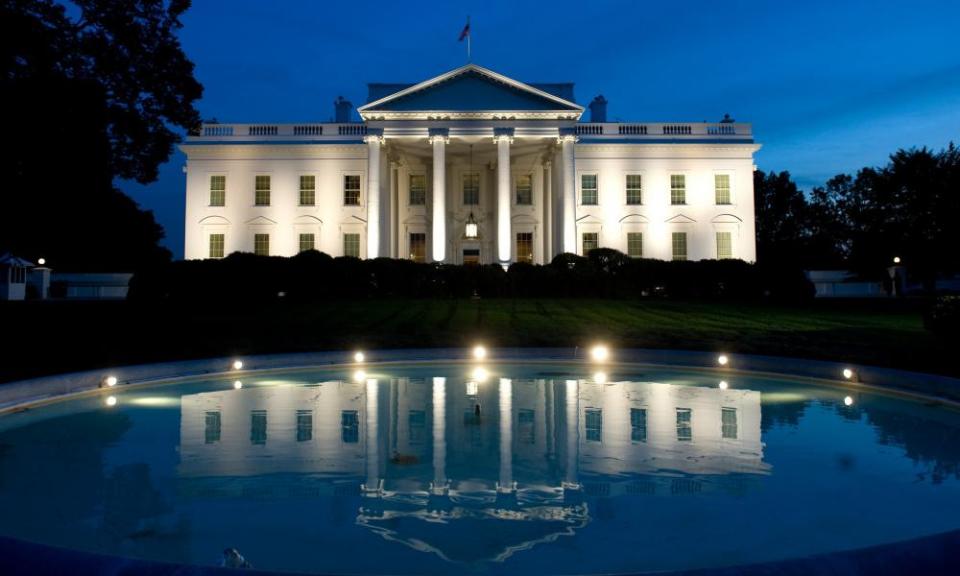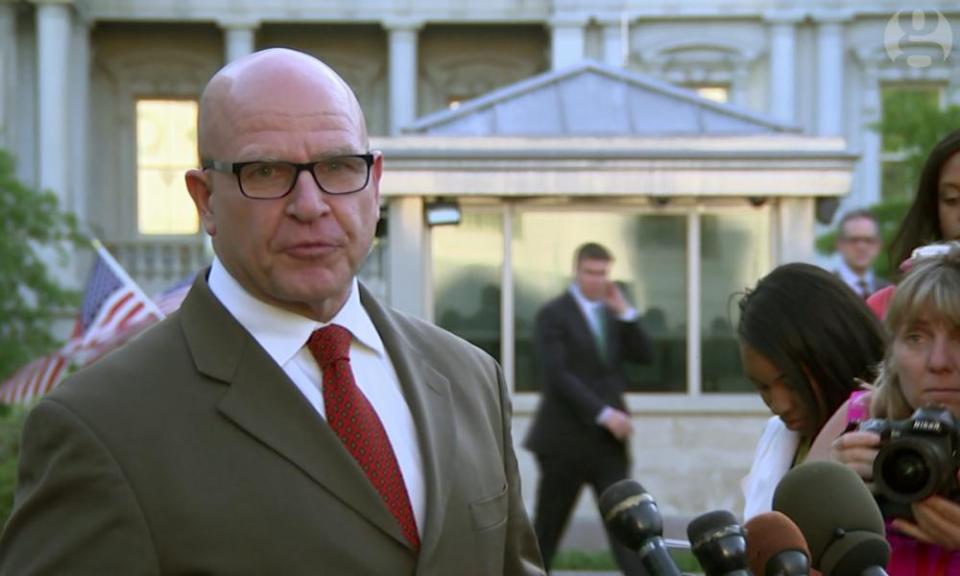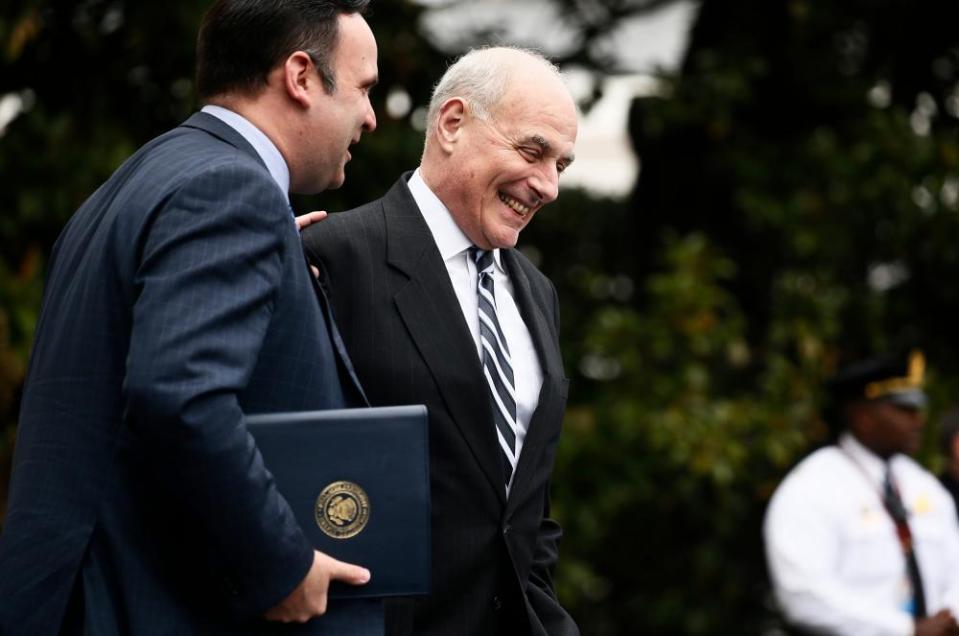'Hollowed out' White House: Trump is on a dangerous path toward no advisers
There’s never been such a rapid turnover of administration personnel in modern times, and the stampede appears to be accelerating

Like many American presidents before him, Donald Trump held court in the East Room of the White House, surrounded by chandeliers, gold curtains, mirrors and portraits of George Washington and Theodore Roosevelt. He had a message for the press: “You know, I read where, ‘Oh, gee, maybe people don’t want to work for Trump.’ Believe me, everybody wants to work in the White House … I could take any position in the White House, and I’ll have a choice of the 10 top people having to do with that position. Everybody wants to be there.”
That was around 3.45pm on Tuesday at a press conference. Less than two hours later, the White House that everyone wants to work for was struggling to explain its latest empty desk. Gary Cohn, Trump’s top economic adviser, had decided to walk away.
Another one bites the dust. There has never been such a rapid turnover of personnel in a US administration in modern times. If anything, the stampede to the exits appears to be accelerating, raising fears of a “brain drain” that will leave key jobs unfilled and make it ever harder to recruit new talent.
“One of the problems here is the White House is getting hollowed out and the number of people capable of doing things, of doing real things whether you agree or disagree ideologically, is getting smaller and smaller,” Chuck Schumer, the Democratic minority leader in the Senate, told reporters. “So the mess-ups we’ve seen this past week, I think we’re going to see over and over and over again.”
Trump, who spent a decade as host of The Apprentice, has enjoyed pulling back the curtain to allow White House meetings to be televised. But he also appears to be copying the reality TV format of eliminating a member of his administration or cabinet on a weekly basis, leaving the audience in suspense: who’s next?
Multiple reports have suggested that it could be HR McMaster, the national security adviser whose style is said to grate with Trump, or Rex Tillerson, the secretary of state who has been repeatedly marginalised.
In addition, John Kelly, the chief of staff once seen as a stabilising force, has been under pressure over his handling of allegations of domestic abuse against his close aide Rob Porter. And Jared Kushner, Trump’s son-in-law and senior adviser, looks especially vulnerable after his security clearance was downgraded and the Russian collusion investigation closes in.

This threatens to leave Trump in ever greater isolation, trusting his gut on policy decisions rather than a dwindling band of advisers whom he relishes setting against each other. “I like conflict,” he said at this week’s joint press conference, as the Swedish prime minister, Stefan Lofven, looked on with a poker face.
Robert Shrum, a Democratic strategist, said: “In terms of modern presidencies, this is the most untethered we’ve ever seen. We now have a situation where we’re being governed by the president’s impulses. If you disagree with him on anything you’re sent to the outer darkness. You have to find a different form of ‘yes’.”
Despite a presidential tweet insisting “There is no Chaos, only great Energy!” (echoing the famed 1979 British newspaper headline, “Crisis? What crisis?”), Shrum added: “The morale has to be rock bottom. The combination of his capriciousness and Kelly’s straitjacket hasn’t helped; it’s made matters worse.
“Most major Republicans don’t want anything to do with the place. It’s a six-months-to-a-year gig. It’s the first White House where we’ve had nothing but short terms unless you’re in the president’s family. It’s bad for the country and bad for the world.”
Some 43% of top-level White House positions have turned over since Trump was inaugurated, according to figures compiled by Kathryn Dunn Tenpas of the Brookings Institution thinktank in Washington. Two years into their terms, Barack Obama’s staff turnover rate was just 24%, while former George W Bush’s was 33%.
Year-two recruitment is more of a challenge for any administration because the post-election enthusiasm has long faded
Kathryn Dunn Tenpas
Seven of Trump’s 12 most senior advisers have resigned, been fired or been reassigned. Staff secretary Porter was forced out a month ago after the domestic abuse allegations against him became public. Communications director Hope Hicks, one of Trump’s closest confidantes dubbed his “real daughter”, announced last week that she would resign. The departure of Cohn suggests that there could now be a runaway effect.
Tenpas writes on the Brookings website: “If history is any guide, retaining senior staff members in year two will be an even more daunting task. All five of Trump’s predecessors experienced a large uptick in second-year staff turnover. Overworked and stressed out, many staff members may see the 12-month mark as the point at which one can claim White House experience and move on to lucrative, private-sector opportunities.”
She adds: “Perhaps the real story this coming year may well be the other side of the turnover coin: filling these senior staff vacancies. Year-two recruitment is more of a challenge for any administration because the post-election enthusiasm has long since faded, the ‘first string’ recruits have been tapped out, and the harsh realities of governing are in full view.”
Only a handful of the old guard are left. Golf caddie turned White House social media director Dan Scavino is the only remaining Trump aide who has been by the president’s side since he launched his election campaign in June 2015. Senior adviser Stephen Miller and White House counsellor Kellyanne Conway, who joined in 2016, have both proved their survival instincts. Trump’s daughter Ivanka also has a senior position, but there has been speculation that she and her husband, Kushner, will call it a day and move back to New York.
The existing staff are stretched increasingly thin. Martha Joynt Kumar, director of the White House Transition Project, told the Associated Press: “You have situations where people are stretched to take on more than one job.”
She offered the example of Johnny DeStefano, who oversees the White House offices of personnel, public liaison, political affairs and intergovernmental affairs. “Those are four positions that in most administrations are each headed by an assistant to the president or a deputy assistant,” Kumar said.

At first glance, the endless comings and goings appear to have little impact on ordinary Americans. But on another, personnel is policy. If tumbleweed is blowing through the West Wing, there are fewer voices to dissuade Trump from the view he expressed at the 2016 Republican national convention: “I alone can fix it.”
On Thursday he defied economics experts and the European Union to impose steep import taxes on steel and aluminium, raising the prospect of a global trade war.
The tariffs decision was criticised by congressional Republicans who, since Trump’s election, had managed to maintain a facade of unity, clinging to his conservative agenda gains and ducking questions about his incendiary tweets, pinball machine volatility and special counsel Robert Mueller’s Russia investigation. Now that facade, too, is crumbling.
Kurt Bardella, a columnist for HuffPost and contributor for USA Today, said: “Year one was as controlled as Trump would allow. Now the safeguards are gone. The training wheels are off and he’s going to be on his own. The concern about the mental state of the president will begin to take shape. I liken him to a toddler who is prone to lashing out: this is a president who is not guided by ideology or policy but by emotion.”
In this “unstable environment” and “unparalleled chaos”, Bardella added, staff will leave and become increasingly hard to replace. “As the situation gets worse, people will be looking for escape hatches. Are there people always wanting to work in the White House and to suck up to power? Of course there are. Are they highly qualified people? Absolutely not.”

